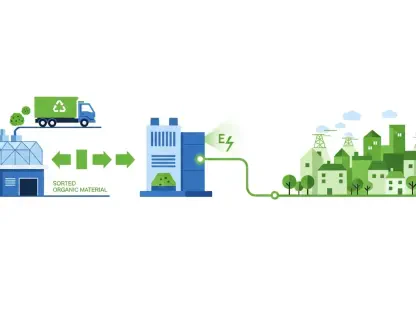How Does PowerDelta Revolutionize EV Charging With Smarter Data Management?
In the rapidly evolving field of electric vehicle (EV) technology, efficient and cost-effective solutions have become paramount. One of the latest innovations making headlines is PowerDelta, a new smart charging algorithm developed collaboratively by Danish EV charging solution provider Spirii and Norwegian technology company Zaptec. Traditionally, EV chargers have sent meter data updates every second, leading to substantial data volumes and higher power consumption at data centers. PowerDelta aims to revolutionize this approach by optimizing data transmission processes within EV charging networks, thus enhancing energy efficiency and significantly reducing costs.
Enhanced Data Efficiency Through Event-Based Updates
One of the standout features of PowerDelta is its ability to reduce data transmission by focusing on significant deviations in power supply rather than continuous updates. Traditional methods involve sending meter data every second, resulting in approximately 30,000 updates during an 8-hour charging session. Such a practice burdens data centers with enormous volumes of data to process, consuming considerable amounts of energy and inflating operational costs. PowerDelta, on the other hand, transmits data primarily when there is a notable change in power supply, such as a 100W change from an 11kW charge, potentially reducing data updates from 30,000 to as few as 100. This approach decreases data processing requirements by over 99%, significantly cutting down on energy consumption and operational costs.
By using an event-based update system, PowerDelta also alleviates the burden on telecom networks, which often struggle with the constant data flow associated with frequent updates. This reduced strain on communication infrastructure not only conserves energy but also contributes to a more reliable and efficient network for all users. The algorithm’s implementation of the Open Charge Point Protocol (OCPP) ensures compatibility with various platforms and seamless integration for charge point operators globally. As a result, the transition to PowerDelta can be smooth, and its benefits immediately realized, showcasing its potential to set new standards in EV charging technology.
Cost Reduction and Energy Savings
The financial implications of adopting PowerDelta are significant. By drastically reducing the amount of data processed, operators can lower their operational costs, making EV charging services more affordable for consumers. Moreover, the reduction in data volume eases the load on data centers, leading to additional energy savings. Given the substantial electricity demands of data centers, the positive environmental impact of reduced power consumption cannot be overstated. Additionally, fewer data updates mean less wear and tear on infrastructure, potentially extending the lifespan of charging equipment and further reducing maintenance costs.
Torben Fog, Chief Information Officer and co-founder of Spirii, has highlighted the revolutionary potential of PowerDelta in cutting data management costs while conserving energy and financial resources. The significant decrease in data volume not only lowers operational expenses but also enhances the overall efficiency of the charging network. This makes PowerDelta an attractive proposition for companies looking to optimize their EV infrastructure while keeping costs manageable. The algorithm exemplifies how smart data management can lead to both financial and environmental benefits, proving that technological advancements can go hand-in-hand with sustainability.
Collaboration and Innovation in EV Infrastructure
The development and successful implementation of PowerDelta underscore the importance of collaboration and innovation in advancing EV infrastructure. Knut Braut, Chief Technology Officer of Zaptec, accentuates the necessity for scalable and efficient charging solutions in light of the growing adoption of electric vehicles. PowerDelta’s ability to manage charging networks more intelligently aligns perfectly with this urgent need. Such collaboration between industry leaders in different regions not only pushes the boundaries of technology but also fosters an environment where sharing expertise leads to groundbreaking solutions.
The urgency for scalable and efficient charging infrastructure cannot be overstated, given the significant growth in the electric vehicle market. With governments worldwide pushing for greener alternatives and setting ambitious targets for EV adoption, the charging industry must innovate continuously to keep pace with demand. PowerDelta is a prime example of how smart algorithms can address pressing challenges like energy consumption and operational efficiency, setting a precedent for future developments. The ongoing efforts in research and development exemplify a broader trend towards creating more efficient and cost-effective EV charging solutions, ensuring the industry evolves in a sustainable manner.
The Future of EV Charging with PowerDelta
In the rapidly progressing field of electric vehicle (EV) technology, finding efficient and cost-effective solutions has become crucial. One of the recent breakthroughs making headlines is PowerDelta, a revolutionary smart charging algorithm. This innovation is the result of a collaboration between Danish EV charging solution provider Spirii and Norwegian technology company Zaptec. Traditionally, EV chargers have been sending meter data updates every second, which leads to large data volumes and increased power consumption in data centers. PowerDelta seeks to transform this traditional approach by optimizing how data is transmitted within EV charging networks, thereby enhancing energy efficiency and substantially cutting costs. Unlike the older methods, PowerDelta reduces the frequency of data updates, intelligently managing when and how data is sent. This not only minimizes data load but also significantly lowers energy usage at data centers. As a result, the new system promises to be a game-changer in the EV market, promoting both economic and environmental benefits for users and providers alike.









